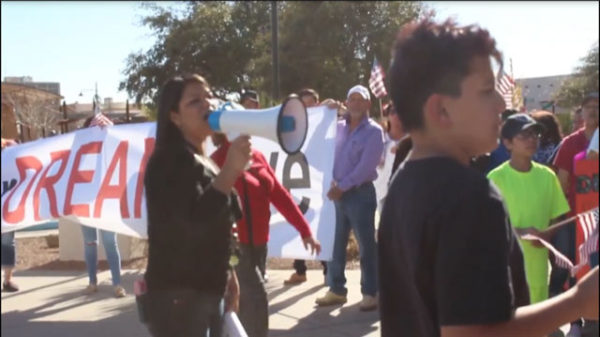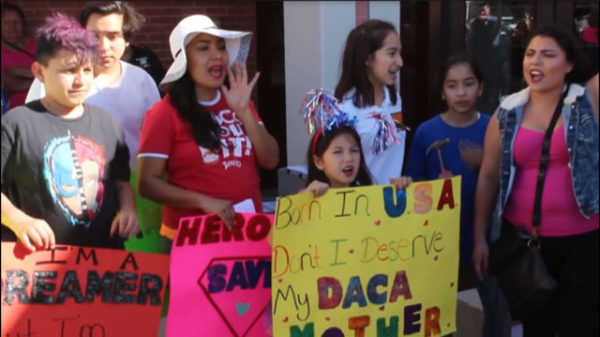El Paso County has approximately 2000 immigrants brought to the U.S. illegally by their parents when they were children who are temporarily protected from deportation by a federal program, known as DACA, approved by former President Obama.
Following the election of President Donald Trump two years ago and his pledge to end the program, the future of these young immigrants, known as Dreamers who now total 11 million, remains in legal limbo as Congress refuses to act on legislation that would provide them with permanent status. They remain in a state of constant fear that the protection from deportation they now enjoy will end in permanent separation from the U.S. family members.
Members of the El Paso-area immigration advocacy organization, Border Network for Human Rights (BNHR), say they are committed to continue to help local Dreamers win the right to remain permanently in the country.

Based in El Paso, Texas, BNHR has a membership of more than 700 families, in parts of West Texas and southern New Mexico. Their mission is to, “organize border communities through human rights education and to mobilize our members to ignite change in policy and practice.”
“Dreamers are everybody,” said Nayeli Saenz, regional coordinator for BNHR and a member for eight years. “You can be a citizen, a resident, or undocumented, or even have DACA. Everybody knows and has knowledge of the struggle.”
She added that the consequence of national immigration policies are felt on the border every day, and her organization wants border residents to have a voice in the debate over stricter immigration controls.
“If you’re a citizen child, you know the struggle that your undocumented parents went through, you understand what the people can’t understand – every day living that fear,” Saenz said.
They specifically back pending federal legislation called The Dream Act (Development, Relief, and Education for Alien Minors Act) introduced in the U.S. Senate by Senator Orrin Hatch,a Republican from Utah, that would create a conditional permanent resident status valid for up to eight years for young undocumented immigrants and would protect them from deportation, allow them to work legally in the U.S., and permit them to travel outside the country.
The bill would automatically grant conditional permanent resident status to existing DACA (Deferred Action for Childhood Arrivals) recipients and others who are eligible to apply for DACA. https://immigrationforum.org/blog/dream-act-of-2017-bill-summary/

U.S. District Judge John Bates on April 25 became the third federal judge to reject President Trump’s explanation for ending the program. He has ordered the Trump administration to continue accepting DACA applications. Bates ordered the administration to continue DACA, which gives protections to immigrants brought to the U.S. as children.
Two days before, the U.S. Border Patrol deported a Dreamer, Juan Manuel Montes, 23, who was caught in California without his DACA permit and deported to Mexico. He was arrested for trying to illegally re-enter the country for the second time this year, according to authorities.
Members of the Border Dreamers and Youth Alliance (BDYA), a branch of BNHR, and dozens of borderland families earlier this year participated in “Walk for Our Dreams” in Las Cruces, NM. Around 200 people, including parents and children, walked to the Las Cruces offices of Sens. Martin Heinrich (D-NM) , Tom Udall (D-NM), and ended at the office of Rep. Steve Pearce (R-NM 2nd District) to voice their support for passage of a “clean” Dream Act, meaning that it would create a pathway to citizenship without additional immigration provisions that harm our communities.
BHNR Communications Director Gabriela Castañeda explained to Marco Grajeda, a Field Representative for Udall: “We need as our communities have insisted upon all along, a policy that accomplishes three things: a clean Dream Act, or an equivalent solution for Mr. Trump’s DACA crisis, provides all dreamers with a pathway to citizenship, recognizes the importance of immigrant families and works to bring them together rather than tear them apart.”
At the event, Castañeda handed a hammer to Grajeda that symbolizes the strength of the community presenting itself. “The task I have laid out is hard, but the hammer is a powerful tool for doing this work, and you will not be alone in this fight,” Castañeda said.
Grajeda said the senator, “has always supported your fight and will continue to support Dreamers. He will continue sharing your stories and talking about the reality of the border.”
“The senator has heard and shared your strong concerns about ending family reunification and he doesn’t want to support a deportation force and a wall that is a waste of money.” said Grajeda.
Heinrich said at a press conference in January that, “Dreamers are the future of a great America. Every day, these talented young people add to the strength of our economy and the vitality of our nation,” he said, and added:
“Congress absolutely must pass the Dream Act without delay. I will be fighting every step of the way and I encourage everyone to do the same. Now is the time to act.”
Pearce, who in the past did not support passage of a Dream Act, in December appears to have changed his position when he wrote on his website of the bill that, “DACA recipients – also known as our friends, neighbors, and coworkers – deserve meaningful change.”
Pearce sent a letter in September 2017 to a House Speaker Paul Ryan “urging” Congress to work together to establish a solution that would protect people under DACA.
